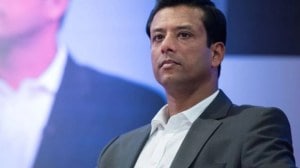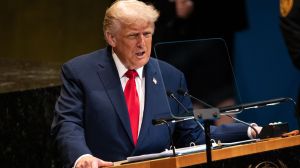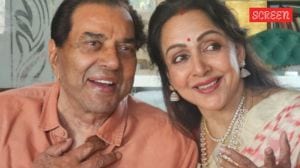UPSC Essentials: Mains answer practice — GS 2 (Week 7)
UPSC CSE Mains 2023 season has begun. Are you ready for it? Here are questions from GS paper 2 for this week with essential points as the fodder for your answers. Do not miss points to ponder and answer in the comment box below. Try them out!
 Attempt questions on Indian polity and governance. Here is the image of new building which have six granite statues devoted to personalities, four galleries each for the two Houses of Parliament, three ceremonial foyers, as many India galleries, and one Constitution gallery, it is learnt. (File)
Attempt questions on Indian polity and governance. Here is the image of new building which have six granite statues devoted to personalities, four galleries each for the two Houses of Parliament, three ceremonial foyers, as many India galleries, and one Constitution gallery, it is learnt. (File) 🚨 This story is part of our special initiative for UPSC and other competitive exams. Look out for UPSC KEY on weekdays and UPSC Essentials everyday, Weekly news express with MCQs, Key Terms of the past week, Quizzes as well as The Indian Express 360° Upsc Debate, Society & Social Justice, UPSC Mains Practice, Art and Culture with Devdutt Pattanaik, UPSC Ethics Simplified, Experts Talk, and more. 🚨
Dear Aspirants,
Thank you for joining us for LIVE sessions. Every day we receive your emails and messages, in large numbers, with queries revolving around news and UPSC preparation in general. Each letter and text makes us feel that we need to do more to make your journey for examination preparation simpler. You will be happy to know that we will be LIVE every week on Wednesdays, take up your queries, provide you with cues from the news, and discuss a relevant theme revolving around news and UPSC preparation in general.
The popular question for the coming week: How to read News, Editorials and Explainers from the ‘5Ws and 1H’ perspective, and more… (Other general queries will also be taken up)
You can send me your queries at manas.srivastava@indianexpress.com or join Telegram: The Indian Express UPSC Hub or ask me Live!
UPSC Essentials brings to you its new initiative for the practice of Mains answer writing. Mains Answer Writing will cover essential topics of static and dynamic parts of the UPSC Civil Services syllabus covered under various GS papers. This answer-writing practice is designed to help you as a value addition to your UPSC CSE Mains.
We will cover one new subject four days in a week. Attempt today’s answer writing on questions related to topics of GS-2 to check your progress.
QUESTION 1
How is a speaker of the Lok Sabha essential in the robust functioning of parliamentary business in India? Discuss.
QUESTION 2
The National Education Policy 2020 is in accordance with Sustainable Development Goal 4 (2030). How it will reorient the education system in India?
General points on the structure of the answers
Introduction
— The introduction of the answer is essential and should be restricted to 3-5 lines. Remember, a one-liner is not a standard introduction.
— It may consist of basic information by giving some definitions from the trusted source and authentic facts.
Body
— It is the central part of the answer and one should understand the demand of the question to provide rich content.
— The answer must be preferably written as a mix of points and short paragraphs rather than using long paragraphs or just points.
— Using facts from authentic government sources makes your answer more comprehensive. Analysis is important based on the demand of the question, but do not over analyse.
— Underlining keywords gives you an edge over other candidates and enhances presentation of the answer.
— Using flowcharts/tree-diagram in the answers saves much time and boosts your score. However, it should be used logically and only where it is required.
Way forward/ Conclusion
— The ending of the answer should be on a positive note and it should have a forward-looking approach. However, if you feel that an important problem must be highlighted, you may add it in your conclusion. Try not to repeat any point from body or introduction.
— You may use the findings of reports or surveys conducted at national and international levels, quotes etc. in your answers.
Self Evaluation
— It is the most important part of our Mains answer writing practice. UPSC Essentials will provide some guiding points or ideas as a thought process that will help you to evaluate your answers.
THOUGHT PROCESS
You may enrich your answers by some of the following points
QUESTION 1: How is a speaker of the Lok Sabha essential in the robust functioning of parliamentary business in India? Discuss.
Introduction:
A simple introduction to this answer can revolve around a general statement about speaker of the Lok Sabha.
— The Constitution specifies offices like those of the President, Vice President, Chief Justice of India, and Comptroller and Auditor General of India, as well as Speakers and Deputy Speakers.
— Article 93 of the Constitution of India provides for Lok Sabha and Article 178 for state Assemblies states that these Houses “shall, as soon as may be”, choose two of its members to be Speaker and Deputy Speaker.
— The Constitution neither sets a time limit nor specifies the process for these elections. It leaves it to the legislatures to decide how to hold these elections. In Lok Sabha and state legislatures, the President/Governor sets a date for the election of the Speaker, and it is the Speaker who decides the date for the election of the Deputy Speaker.
(Source: sansad.in)
Body:
You may incorporate some of the following points in the body of your answer:
Role of Speaker in the robust functioning of parliamentary business in India
— The final authority for adopting rules for regulating its procedure rests with each House, but a perusal of the rules of the Indian Parliament would indicate that the Presiding Officers in the two Houses are given vast powers by the rules.
— The presiding officer decides:
(i) The admissibility of a Question.
(ii) When a member shall speak and how long he/she shall speak
— If he/she is satisfied, the Speaker can direct a member to withdraw from the House for a specific period of time.
— The Speaker is the guardian of the rights and privileges of the House, its Committees and members. It depends solely on the Speaker to refer any question of privilege to the Committee of Privileges for examination, investigation and report.
— It is the Speaker who decides the form and manner in which the proceedings of the House is published.
— He/She also issues warrants to execute the orders of the House, wherever necessary, and delivers reprimands on behalf of the House.
— When a decision of the House is to be ascertained on a motion made by a member, the question is put by the Speaker before the House to obtain the decision. On questions of points of order, it is he/she who finally decides whether the matter raised is in order or not.
— The Speaker also has certain residuary powers under the Rules of Procedure.
— The Speaker issues from time to time directions which are generally treated as sacrosanct as the Rules of Procedure.
— On matters regarding interpretation of constitutional provisions relating to the House or the Rules of Procedure, he/she often gives rulings which are respected by members and are binding in nature.
— He/She certifies Money Bills and decides finally what are money matters by reason of the Lok Sabha’s overriding powers in financial matters
— The Speaker does not vote in the House except on those rare occasions when there is a tie at the end of a decision.
(Source: sansad.in)
Conclusion:
Your conclusion should be short.
— According to the book Practice and Procedure of Parliament, published by the Lok Sabha Secretariat, the Speaker is “the principal spokesman of the House, he represents its collective voice and is its sole representative to the outside world”.
— The Speaker is the constitutional and ceremonial head of the House. He/She is the principal spokesperson of the House. It is in him/her that the responsibility of conducting the business of the House in a manner befitting the place of the institution in a representative democracy is invested.
(Source: sansad.in, Explained: How are a Speaker and Deputy Speaker elected? by Chakshu Roy)
Points to Ponder
Other Powers of Speaker
Related Previous Year Questions
Once a Speaker, Always a Speaker’! Do you think this practice should be adopted to impart objectivity to the office of the Speaker of Lok Sabha? What could be its implications for the robust functioning of parliamentary business in India? (2020)
The Indian Constitution has provisions for holding a joint session of the two houses of the Parliament. Enumerate the occasions when this would normally happen and also the occasions when it cannot, with reasons thereof. (2017)
QUESTION 2: The National Education Policy 2020 is in accordance with Sustainable Development Goal 4 (2030). How it will reorient the education system in India?
Introduction:
A simple introduction to this answer can revolve around a general statement about education and national education policy, 2020.
— Education is fundamental for achieving the potential of humans, developing an equitable and just society, and promoting national development.
— Access to quality education is the key to India’s continued ascent, and leadership on the global stage in terms of economic growth, social justice and equality, scientific advancement, national integration, and cultural preservation.
— The global education development agenda reflected in Goal 4 (SDG4) of the 2030 Agenda for Sustainable Development, adopted by India in 2015 – seeks to “ensure inclusive and equitable quality education and promote lifelong learning opportunities for all” by 2030.
— National Education Policy is a comprehensive framework to guide the development of education in the country.
(Source: dsel.education.gov.in, Explained: India’s National Education Policy, 2020 by Ritika Chopra)
Body:
You may incorporate some of the following points in the body of your answer:
National Education Policy (Key Takeaways)
— Ensuring quality early childhood care and education for all children between 3-6 years
— New Curricular and Pedagogical Structure (5+3+3+4)
— Establishing National Mission on Foundational Literacy and Numeracy
— A separate Gender Inclusion fund and Special Education Zones for disadvantaged regions and groups
— It aim to increase the GER to 100 per cent in preschool to secondary level by 2030 whereas GER in Higher Education including vocational education to 50 per cent by 2035.
— Setting up of National Research Foundation
— Achieving 100% youth and adult literacy.
— The Centre and the States will work together to increase public investment in the Education sector to reach 6% of GDP at the earliest.
Reorientation of Education in India
— The policy has marked a major positive breakthrough in the form of the National Education Policy 2020 — re-imagining the educational landscape through equity, inclusion and excellence in education. It is based on the pillars of Accessibility, Equity, Quality, Affordability, and Accountability.
— The policy emphasises early childhood care and education with universal provisioning and equipping young children to participate and flourish in the educational ecosystem.
— There is an emphasis on the primacy of the formative years from ages 3 to 8 in shaping the child’s future.
— The focus on instruction in the mother tongue is largely to celebrate the idea of being Indian, globalising Indian thoughts, eulogising the rich cultural heritage of our country and bringing it to our classrooms.
— The holistic development and a wide choice of subjects and courses are proposed as the new distinguishing feature of secondary school education.
— The schools are aiming to introduce vocational courses with internships.
— The curricular and pedagogical initiatives including the introduction of contemporary subjects such as artificial intelligence, design thinking, holistic health, organic living, etc, are integrated.
— To ensure the quality of teacher education across all stages, the policy envisions teacher career progression via meritocracy and 360-degree assessments.
(Sources: How National Education Policy 2020 is transforming the vision for education in India by Sudha Acharya, pib.gov.in)
Conclusion:
Your conclusion should be short.
— The National Education Policy will play a critical role in the entire education system to be reconfigured to support and foster learning so that all of the critical targets and goals (SDGs) of the 2030 Agenda for Sustainable Development can be achieved.
Related Previous Year Questions
Professor Amartya Sen has advocated important reforms in the realms of primary education and primary health care. What are your suggestions to improve their status and performance? (2016)
The quality of higher education in India requires major improvements to make it internationally competitive. Do you think that the entry of foreign educational institutions would help improve the quality of technical and higher education in the country? Discuss. (2015)
Post your inputs and answers to points to ponder in the comment box below and engage with other aspirants too. All the best!
(The UPSC Essentials Indian Express is now on Telegram- Indian Express UPSC Hub. Click here to join our YouTube channel and stay updated with the latest updates.
UPSC Magazine

Read UPSC Magazine
- 01
- 02
- 03
- 04
- 05































